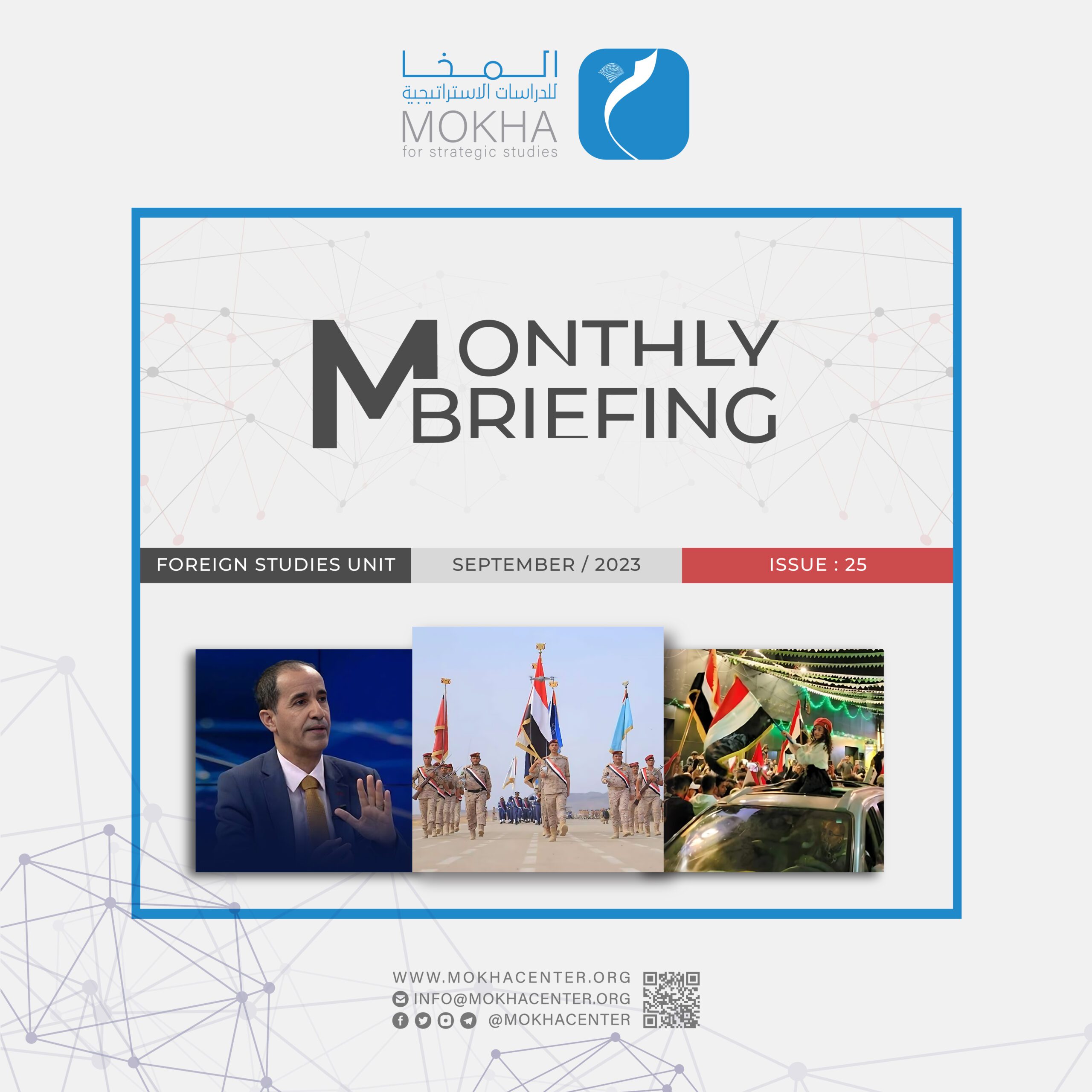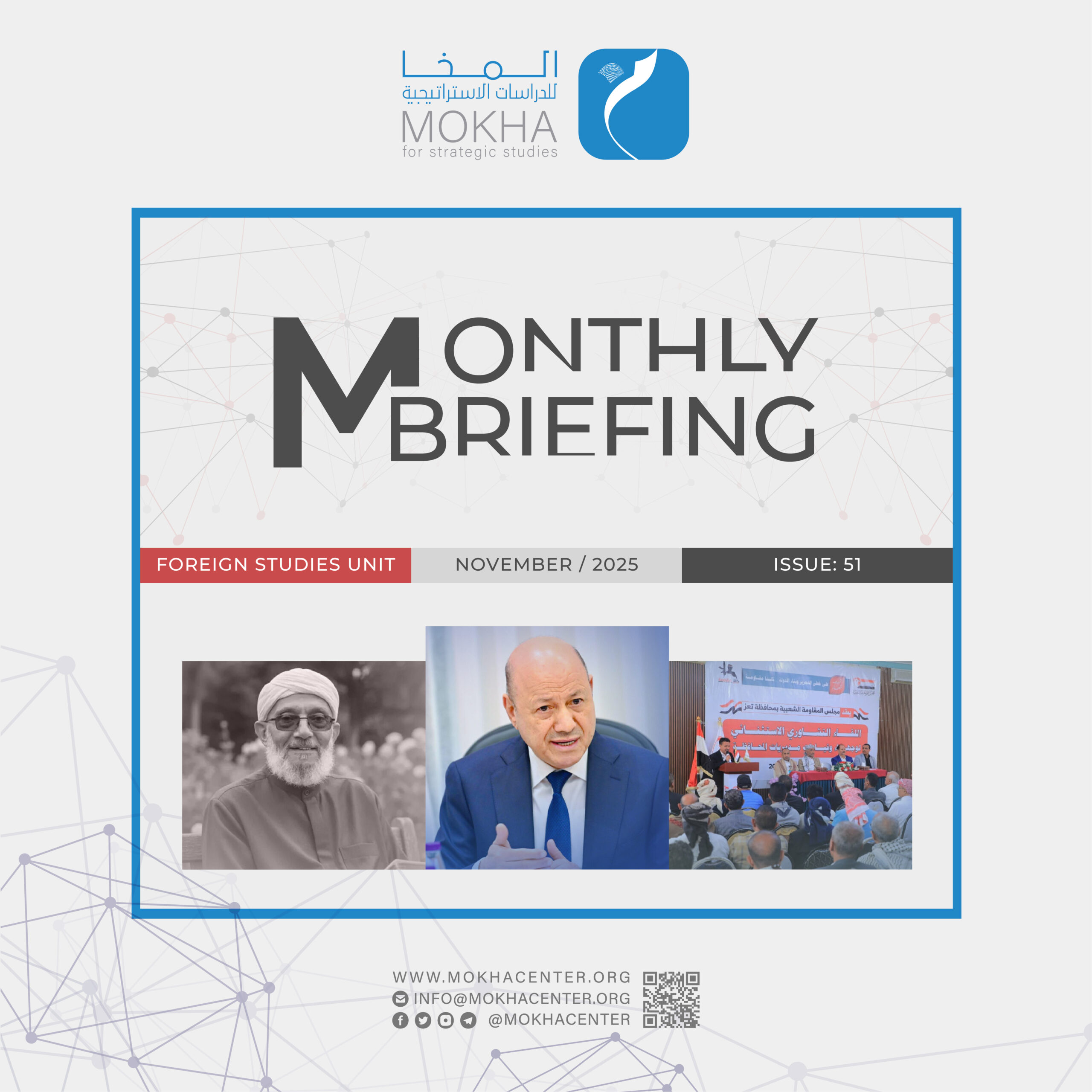Monthly Briefing / September – 2023

Political Scene
The month of September witnessed a significant event with the visit of the Houthi negotiating delegation to Riyadh, accompanied by the Omani delegation. This visit was marked by optimistic statements from both sides. However, the positive atmosphere was short-lived as the Houthis subsequently attacked the Saudi border, leading to casualties among coalition forces, including Bahrainis and Saudis. Concurrently, Al-Masirah TV delivered a strong, critical speech against the Saudi leadership in response to statements made by the Crown Prince regarding the potential for normalization with Israel. As well, tensions escalated between the Houthi group and a substantial portion of young people who took to the streets to commemorate the anniversary of the September 26 revolution.
- The United States’ Ambassador to Yemen, Stephen Fagin, emphasized the significance of maintaining stability in the security situation within Hadramaut, the largest governorate in Yemen. His statement came after his visit to Sayun, the governorate’s capital, during which he held discussions with local authority officials. Notably, this visit marked his second trip to the region in less than two months. August 30
- Saudi Arabia officially extended an invitation to a delegation from the Houthi group to resume meetings and discussions. This invitation is in line with the Saudi initiative unveiled in March 2022 and follows the investigations conducted by the Saudi team, led by the Ambassador to Yemen, Muhammad Al Jaber. September 14
- The chairman of the Leadership Council, Rashad Al-Alimi, held discussions with U.S. Secretary of State Anthony Blinken during the United Nations General Assembly meetings in New York. Their talks revolved around the evolving situation in Yemen, as well as the mediation efforts led by Saudi Arabia and Oman. The primary aim of these efforts is to renew the ceasefire and initiate a comprehensive political process under the auspices of the United Nations. September 18
- Saudi Defense Minister Prince Khalid bin Salman met with a delegation from the Houthi group, which had recently visited Riyadh to continue their ongoing dialogues. However, specific details or outcomes of these meetings were not disclosed. September 20
- Following the conclusion of discussions in Riyadh, the Houthi group delegation returned to Sanaa along with the Omani delegation. Unfortunately, these talks did not produce any specific outcomes, despite months of anticipation. It remains uncertain when a new round of negotiations might be scheduled. September 20
- Aidroos Al-Zubaidi, a member of the Presidential Leadership Council and the leader of the UAE-backed Southern Transitional Council, expressed his dissatisfaction with what he perceived as Saudi Arabia’s marginalization toward them during the unilateral talks conducted by the Kingdom with the Houthi group. He voiced these concerns in statements given to the British newspaper The Guardian. September 21
- The Yemeni government accused Iran of smuggling weapons to the Houthi rebels through the port of Hodeidah. They called upon the international community to exert serious pressure on the Houthis in order to compel them to engage in peace initiatives. September 22
- Saudi Crown Prince Mohammed bin Salman emphasized that it is now time to work toward ending the conflict in Yemen and transitioning toward sustainable political stability. He underlined Saudi Arabia’s commitment to continuing its support for Yemen. September 23
- Al-Masirah Channel, affiliated with the Houthi group, characterized Saudi Arabia and its Crown Prince, Mohammed bin Salman, as betrayers and inconsequential figures, in response to recent statements made by the Crown Prince regarding the potential for normalization with Israel. September 24
- The United Nations envoy to Yemen strongly condemned the Houthi attack that resulted in the death of two Bahraini soldiers and multiple injuries among Saudi soldiers. He warned against further military escalation and increased violence, which could hinder peace efforts in the region. September 26
- The governorates of Sana’a, Ibb and Al-Hudaydah in Yemen saw significant demonstrations held to mark the 61st anniversary of the September 26 revolution. These commemorations were organized in response to the Houthi group’s attacks on celebrants, which included night marches and daytime protests in Ibb and Sana’a. In reaction to these gatherings, the Houthis initiated an extensive campaign of abductions. September 26
Military Scene
On the anniversary of their seizure of power in Sanaa, the Houthi group showcased their military forces (Iranian origins) in an effort to overshadow the memory of the September 26 revolution. In response, the national army in Ma’rib also displayed its military might to mark the anniversary of the September 26 revolution. Despite the truce, sporadic confrontations between the government army and the Houthi group persist on most fronts, with ongoing mobilization efforts in these areas.
- The Houthi group announced the deaths of six of its field leaders within a week on the battlefronts, including two holding the rank of Brigadier General. This occurred despite the ongoing truce that has been in effect since April 2022, although they did not disclose the specific locations of these fatalities. September 17
- The United Nations mission in Hodeidah documented a significant surge — 122% — in civilian casualties resulting from landmines during August, compared to the figures from July. Disturbingly, the majority of these victims were children and women, with many of these explosive devices attributed to the Houthi group. September 24
Security Scene
While there has been a significant decline in military confrontations between the legitimate government and the Houthi group, the overall security situation is deteriorating. The government and joint forces have reported setbacks in their attempts to dismantle Houthi group cells in Ma’rib and the western coast, as well as to intercept drug shipments in international waters. Moreover, the security turmoil in Shabwa Governorate has intensified, marking a significant departure from the stability that was maintained during the tenure of the former governor, particularly under the influence of the UAE.
- Egyptian authorities apprehended Adel Al-Shujaa, a journalist, academic and leader of the General People’s Congress Party. His arrest was attributed to his critical writings concerning the government and the coalition in Yemen. There are concerns that he may be deported to Aden, a move that has raised human rights alarms for the potential threat to his life. September 18
- The military media of the Joint Forces released the statements of two individuals connected to a “terrorist cell associated with the Houthi group.” These individuals admitted their intent to place explosive devices along the road connecting Mocha and the city of Taiz in August. They revealed that they were operating under the auspices of a Houthi unit known as the “Humanitarian Operations Unit.” September 20
- A British Royal Navy warship intercepted a suspicious sailboat in the northern Arabian Sea and confiscated approximately a half-ton of drugs valued at $3.5 million. This region is widely recognized as a prominent smuggling route from Iran to the Houthi group in Yemen. September 20
Economic Scene
Even with the Saudi deposit announcement, inflation of the Yemeni riyal continues to escalate. The overall economic landscape in the country is fraught with numerous challenges, including the persistent threat of a return to conflict, the halt in oil production, the discontinuation of gas exports and soaring inflation rates. These factors have exacerbated the humanitarian crisis and compounded the already severe economic hardship faced by Yemen.
– The Central Bank of Yemen conducted an “exceptional” public auction, offering $30 million for sale. However, it was only able to sell $14 million. Concurrently, the Yemeni riyal’s value continued to decline, erasing most of the gains it had made since the start of last August, despite Saudi Arabia’s announcement of over a billion dollars in support of the government budget. August 31
– The Austrian OMV company, which operates in the Al-Uqla oil sector in the eastern part of Shabwa Governorate of Yemen, has disclosed its plans to terminate the employment of 200 of its workers at the beginning of the coming year. This decision has been made in an effort to prevent a complete shutdown, as crude oil exports and sales have come to a complete halt since October 2022. September 5
Violations
During this month, Yemen witnessed grave human rights violations, including instances of extrajudicial killings, such as the tragic case of a doctor in Dhamar Governorate who was killed by an assailant associated with the Houthi group. There were also reports of arbitrary arrests, cases of torture, the recruitment of children into armed groups, obstructing access to humanitarian aid, and organizations reporting a surge in trials against political dissidents. Additionally, kidnapping campaigns targeted individuals who had participated in Yemeni National Day celebrations, commemorating the anniversary of the September 26 revolution.
– The International Committee of the Red Cross has expressed serious concern over the rising number of casualties from landmines in Yemen, totaling 1,469 victims in just five years. Yemen has been categorized as one of the most heavily contaminated regions globally with explosive remnants of war, with international estimates indicating the presence of approximately one million mines laid during the years of conflict. August 11
– In a decision made by a court associated with the Houthi group in Sana’a, it was ruled that three doctors and the Pharmaceutical Authority must provide compensation (blood money) in the case involving the tragic deaths of 11 children and the infection of 10 others due to a tainted drug for blood cancer. Notably, the court overlooked the individual responsible for importing the medicines, who holds close ties to the Minister of Health. August 24
– Committees associated with the Houthi group have initiated a data-collection effort concerning the citizens, their properties (including residences, shops and real estate) and their sources of income. They are requiring individuals to complete official forms with precise information. This move aims to broaden the scope of levies and taxes imposed by the group on the citizens. September 15
– France-Presse has reported a distressing incident involving children battling leukemia at Kuwait University Hospital in Sana’a. The symptoms observed in these children over the past month have mirrored those that led to the tragic deaths of over 20 children last year after they were administered a dose of methotrexate. September 22
– The Houthi group initiated oppressive operations against individuals participating in the anniversary celebrations of the September Revolution in Sanaa, Ibb and Dhamar. They established checkpoints and halted vehicles belonging to citizens displaying national flags and coerced them, often at gunpoint, to remove these flags. September 26
Humanitarian Scene
- The World Food Program said that it is forced to reduce cash and food aid in Yemen due to a severe lack of funding. This will include school meals and aid provided to fight malnutrition. August 28
- The World Health Organization has issued a warning regarding a surge in measles and rubella cases affecting children in Yemen. The number of suspected cases has reached 34,413, with fatalities recorded through the end of last July. This marks a substantial increase compared to the previous year, during which there were 27 suspected cases and 220 deaths. The situation is particularly concerning for pregnant women. August 31
- The United Nations International Organization for Migration has reported that, since the start of 2023, over 25,000 Yemeni people have been displaced due to the enduring conflict in the country, which has persisted for eight years. According to their weekly report, from January 1 to September 2, 2023, 25,128 individuals, representing 4,188 families, were displaced.
Statistics
- During the second week of September, the Masam Mine Clearance Project in Yemen reported the successful removal of 968 mines, unexploded ordnance and explosive devices. This achievement brought the overall total to 1,751 items removed, along with the clearance of 216,222 square meters of land. Since the beginning of the month, a cumulative total of 467,887 square meters has been cleared.

